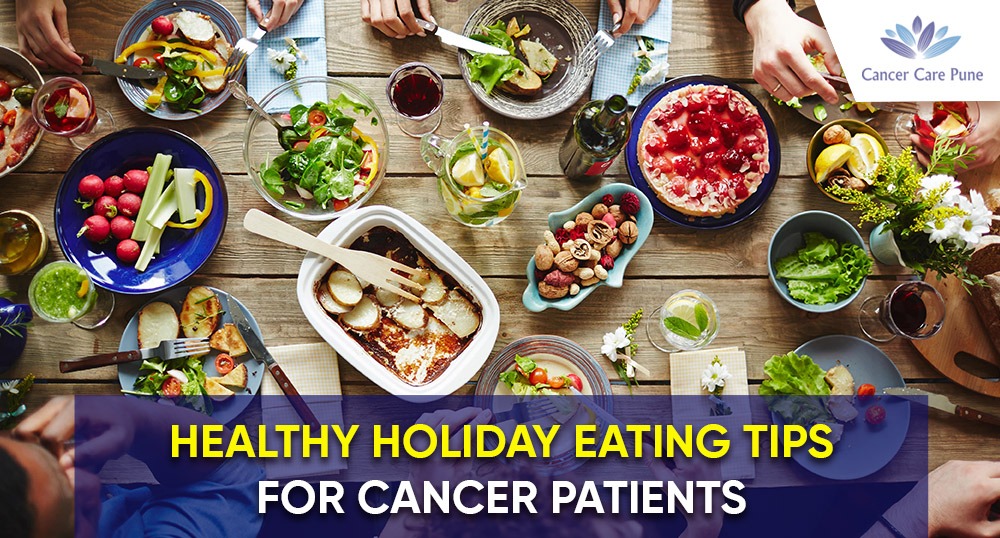
It’s the time of year for scrumptious and rich dishes. However, it’s critical to make an effort to keep up healthy eating habits as you socialize this holiday season if you or a loved one is receiving cancer treatment. A nutritious diet before, during, and after cancer treatment may help you feel better, stay stronger, maintain a healthy weight, and fight infection. Nutritious meals not only strengthen the immune system.
You are not required to forgo all of your favourite holiday dishes because of this. With a few changes, you can still anticipate delectable roast turkey and stuffing, smooth green bean casserole, and even frosted sugar cookies.
We’ll provide advice on how cancer patients can enjoy holiday dinners and gatherings both during and after treatments in this post. Topics covered include:
- Eating cookies and having them too.
How can people with cancer manage family gatherings, football parties, office and community
events, and even the much-loved cookie exchange?
As a cancer specialist at Cancer Care, Dr. Jagdish Shinde advises, “Try to concentrate on fueling your body with healthy meals throughout the holidays, while balancing the comfort that may come from enjoying some of your holiday favourites with family and friends.”
“The 80-20 rule, where 80% of the foods and beverages you consume are nutritious and 20% are a little more decadent, is a fantastic way to balance what you eat,” he advises.
- Holiday nutrition advice
Dr. Jagdish Shinde provides the following dietary advice, recipe alterations, and methods for managing medication side effects that can affect your appetite to make it simpler for you to select healthy food selections when attending holiday gatherings:
- Avoid eating before attending holiday events. Eat something small, such as fresh fruit or vegetable sticks with nut butter or yoghurt, before you go. This method assists in regulating blood sugar levels and reducing cravings for sweet meals.
- Replace desserts that are high in sugar and low in nutrition with fruit or fruit cobblers.
- For lesser servings, use a salad plate. Your plate should include primarily plant-based items.
- Be selective and only bring stuff you want to eat.
- Suitable substitutions for holiday recipes
Dr. Jagdish Shinde also recommends the straightforward ingredient swaps listed below for classic high-fat meals including cheeses, dips, and baked goods. You may enjoy healthier versions of your favourite foods without sacrificing flavour by making a few simple tweaks.
- If you want to cut fat and cholesterol without sacrificing flavour, use two egg whites in place of one.
- Reduce the amount of butter or margarine in mashed potatoes by flavouring them with low-sodium, fat-free (or reduced-fat) chicken broth.
- In muffins and bread, swap oil, margarine, or butter for applesauce.
- Yogurt without fat (or with decreased fat) can be used as a topping for pies and sauces.
- Instead of fried onion rings, try topping your dish with sliced almonds for a crunch.
- For salads and casseroles, use reduced-fat or low-fat cheeses, like mozzarella.
- Considerations for holiday drinking
Dr. Jagdish Shinde strongly advises against consuming alcohol while receiving cancer treatment, and advises patients to discuss any alcohol use with their medical professionals.
He warns that drinking alcohol “may interfere with several cancer treatments and may enhance the likelihood of negative effects.” “Even very little drinking may have a significant effect.”
The potential for dehydration is one of alcohol consumption’s significant negative effects. Because alcohol is a diuretic, it causes the body to eliminate fluids from the blood considerably more quickly than it would without alcohol. You could soon become dehydrated if you don’t consume enough water when drinking alcohol.
- Managing the negative effects of treatment
Holiday celebrations sometimes concentrate on food, which may provide difficulties for some cancer patients. For instance, chemotherapy patients may struggle with a loss of appetite. Others may be struggling to consume and digest many traditional holiday foods due to nausea, digestive problems, taste changes, mouth ulcers (mucositis), or other treatment-related adverse effects.
Dr. Jagdish Shinde gives suggestions you and your holiday hosts may utilize to adjust to some frequent side effects and make meal items healthier or more appetizing for those in treatment if you’re feeling well enough to spend time with loved ones.




